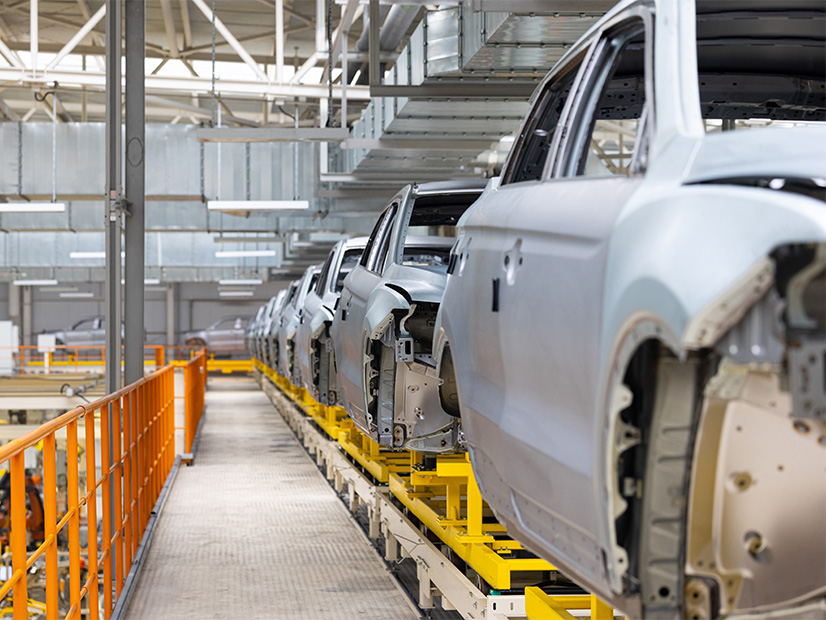The Department of Energy on Monday announced new funding totaling $3.16 billion aimed at jumpstarting the buildout of a U.S. supply chain for lithium-ion batteries for electric vehicles and grid-scale storage.
DOE is dedicating the lion’s share — $3.1 billion — to support the development of new commercial-scale plants for battery material processing, with a particular focus on cathode materials such as lithium and graphite. Grants for retrofitting existing plants or for demonstration projects are also part of the package. Individual grants will range from $50 million to $100 million, according to the funding opportunity announcement.
An additional $60 million will go to fund recycling projects and “second-life” applications for EV batteries. Grants for recycling buildout will range from $6 million to $12 million, and for second-life demonstrations, from $4 million to $6 million.
The funding is the first installment of $7 billion in the Infrastructure Investment and Jobs Act (IIJA) dedicated to the battery supply chain. At present, U.S. battery manufacturers are largely dependent on China, which dominates global lithium and other key mineral processing and battery cell manufacturing.
To further encourage a closed-loop U.S. supply chain, the announcement states that “priority consideration” will be given to projects that “will not use battery material supplied by or originating from a foreign entity of concern,” an official designation tracked by the Commerce Department. Chinese companies account for about a third of all organizations on the list.
“Positioning the United States front and center in meeting the growing demand for advanced batteries is how we boost our competitiveness and electrify our transportation system,” Energy Secretary Jennifer Granholm said in a statement released by the DOE. This “investment in battery production will give our domestic supply chain the jolt it needs to become more secure and less reliant on other nations.”
Administration officials also framed the new funding as a way to address current market volatility caused by Russia’s invasion of Ukraine, as reported in E&E News.
During a Monday press call with reporters, Brian Deese, director of the White House Economic Council, said, “We’ve seen even in just recent days [Russian President Vladimir] Putin trying to use Russia’s energy supply as a weapon against other nations. This funding announcement will punch above its weight in not only accelerating the transition to a clean transportation future, but also in securing one of the most important supply chains in the U.S. economy.”
The DOE has set an ambitious schedule for the application process and award selection for the grants, with first letters of intent to apply due May 27, applications due July 1 and awards to be announced in October. Applicants will be expected to match the grants dollar for dollar, for a 50-50 cost share.
The funding announcement includes a range of potential safeguards to ensure the companies receiving the grants can deliver on their projects. Applicants must have offtake agreements or letters of commitment from the companies that will buy the processed minerals or components they produce. They must also supply information on the project’s potential output and purity of materials produced.
A domestic supply chain for raw materials is also encouraged, for example, sourcing minerals from recycled batteries, coal or hard rock mine tailings or refuse materials.
“Responsible and sustainable domestic sourcing of the critical materials used to make lithium-ion batteries — such as lithium, cobalt, nickel and graphite — will help avoid or mitigate supply chain disruptions and accelerate battery production in America to meet this demand and support the adoption of electric vehicles,” the DOE release said.
The Future of Mobility
A former governor of Michigan, Granholm returned to her home state on Monday, accompanied by local lawmakers, to promote the energy programs, such as the battery supply chain grants, made possible by the $1.2 trillion IIJA. Many of Michigan’s top automakers, such as General Motors and Ford, are in the process of converting their fleets to electric, with major market growth anticipated in the coming decade.
According to figures from the DOE, more than 2.5 million plug-in EVs have been sold in the U.S., including 800,000 since President Joe Biden took office.
“The future of mobility is electric — and [the new grants] could help to ensure Michigan remains on the forefront of innovation by shoring up our supply chains for advanced battery technologies necessary to deploy the next all-electric fleet,” said Sen. Gary Peters (D-Mich.).
According to the EPA, transportation accounts for 29% of U.S. greenhouse gas emissions, more than the electric power sector. Biden has set ambitious targets for EV adoption — 50% of all U.S. auto sales by 2030 — and the IIJA also contains $7.5 billion to help states install 500,000 EV chargers nationwide.
The funding announcement is the latest in a series of White House actions intended to lessen U.S. dependence on foreign sources for the critical minerals essential for battery storage and other clean technologies. On March 31, Biden invoked the Defense Production Act to accelerate “sustainable and responsible domestic mining … and value-added processing of strategic and critical materials for the production of large-capacity batteries for the automotive, e-mobility and stationary storage sectors.”




